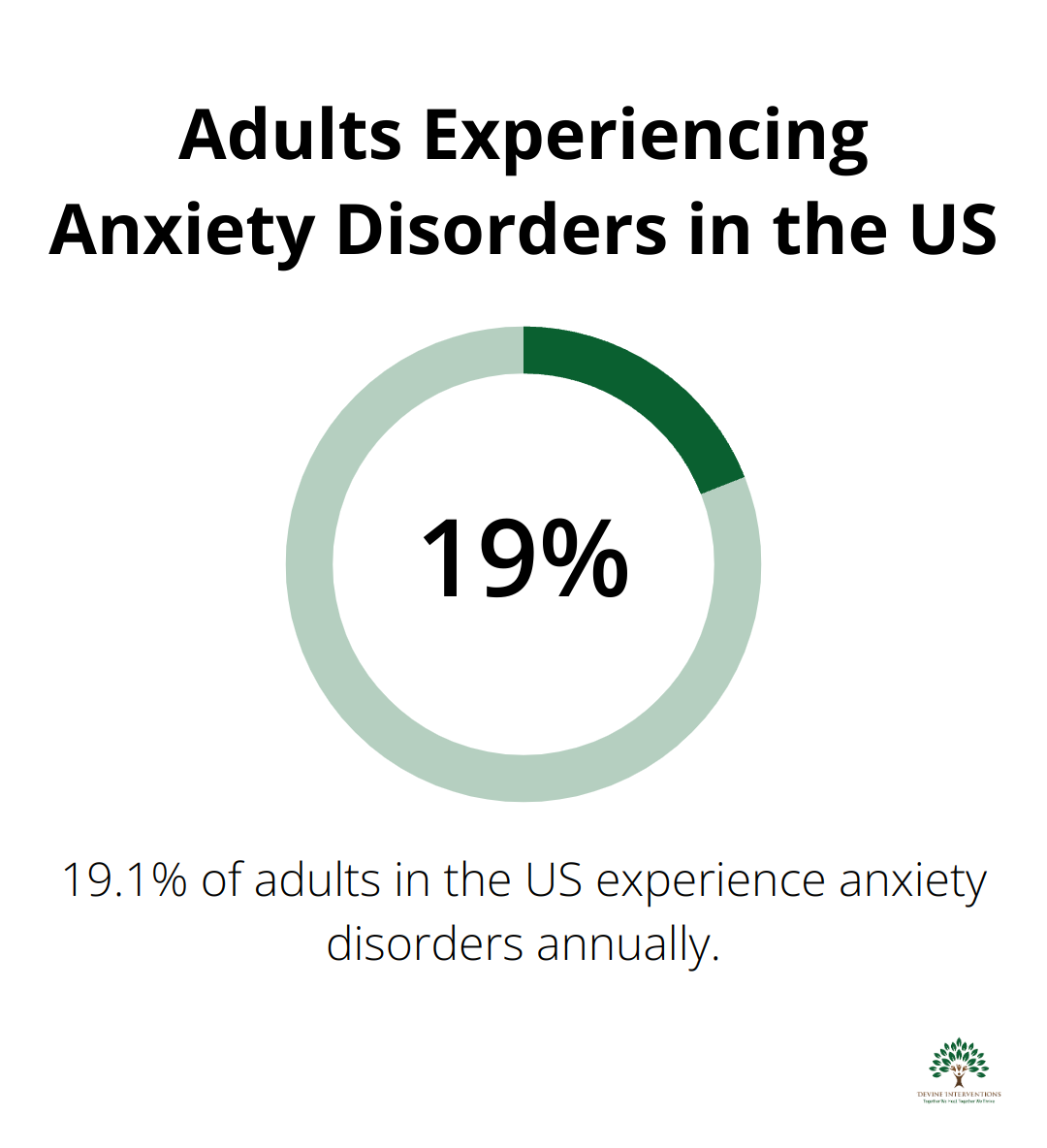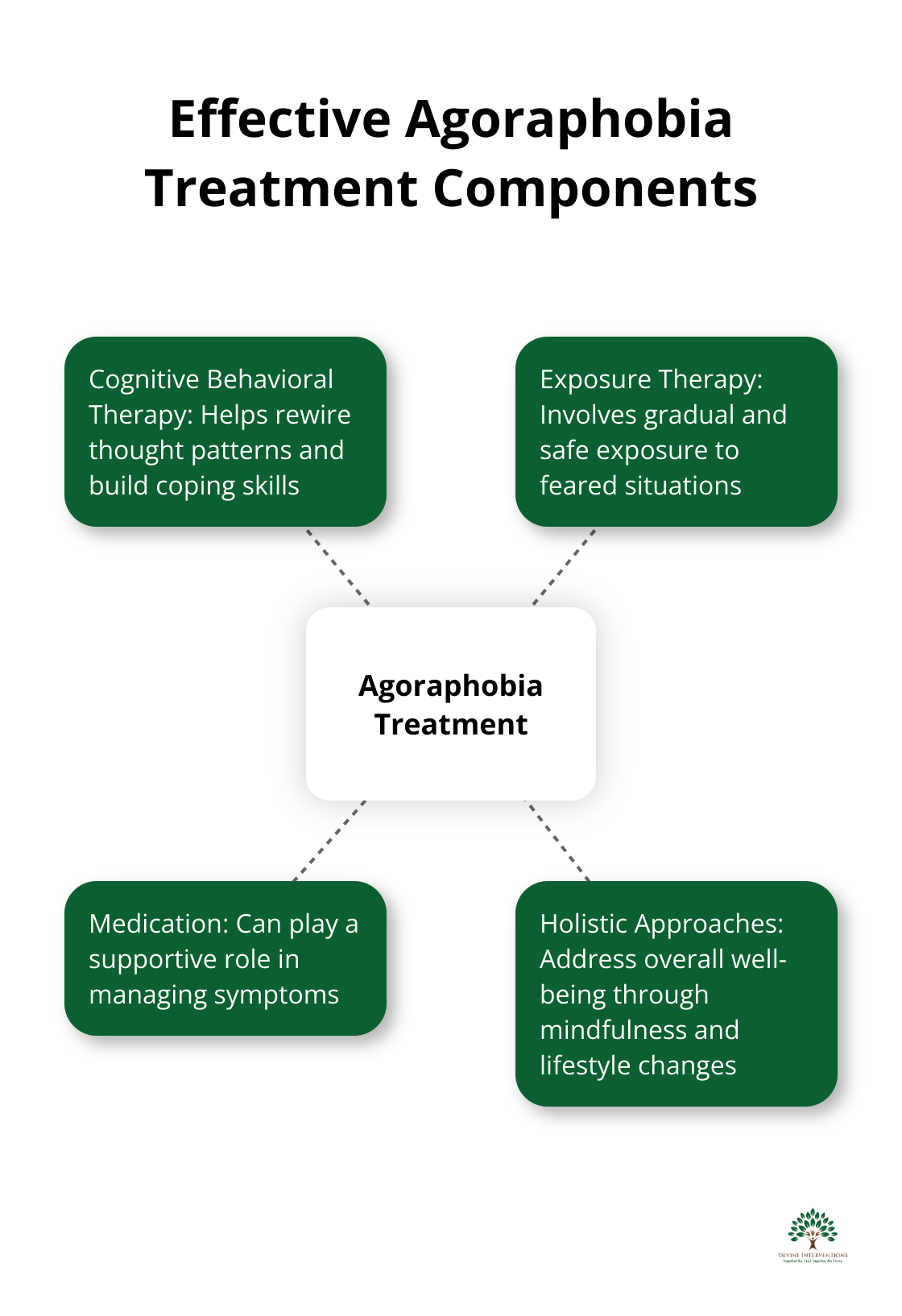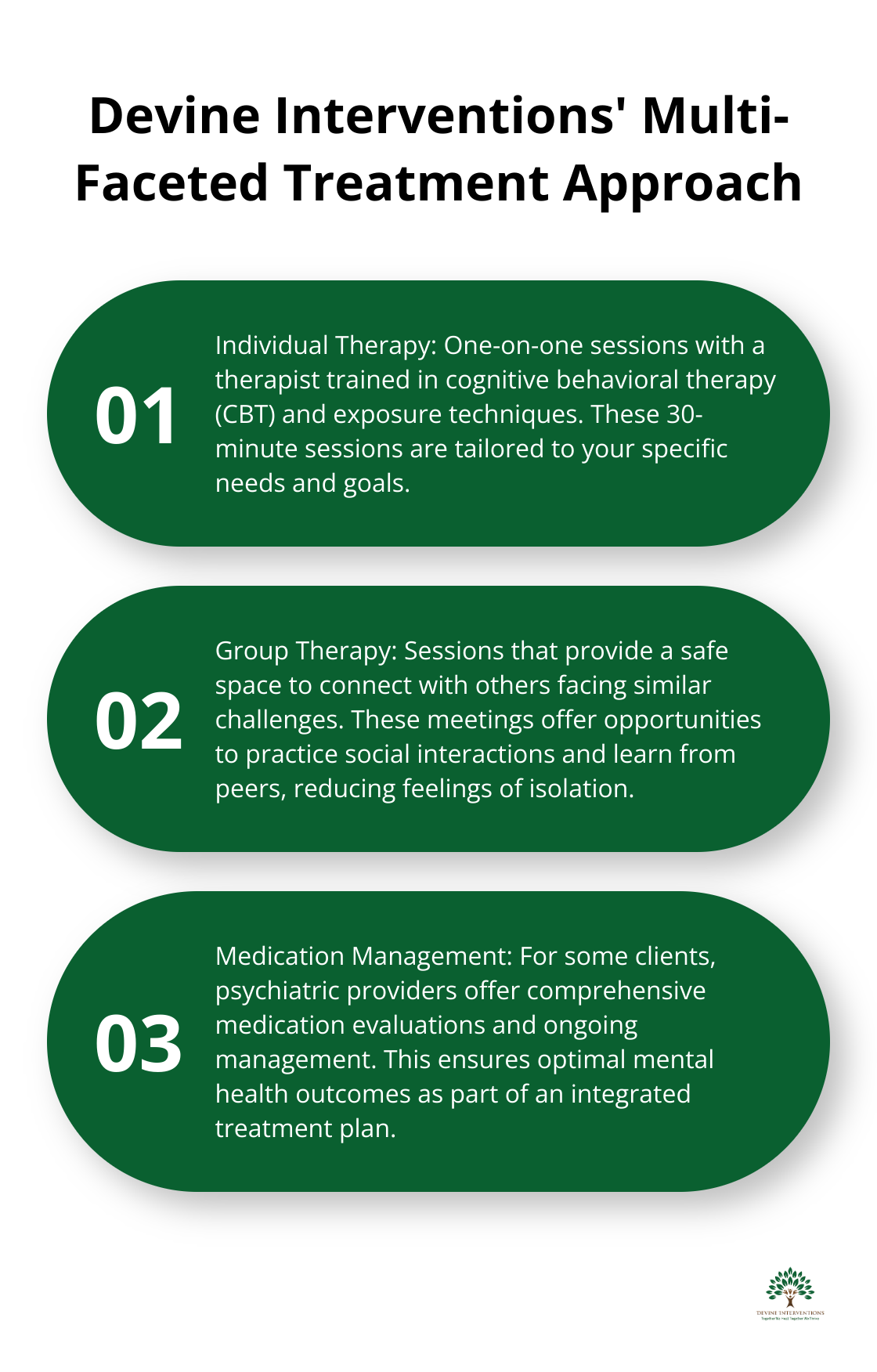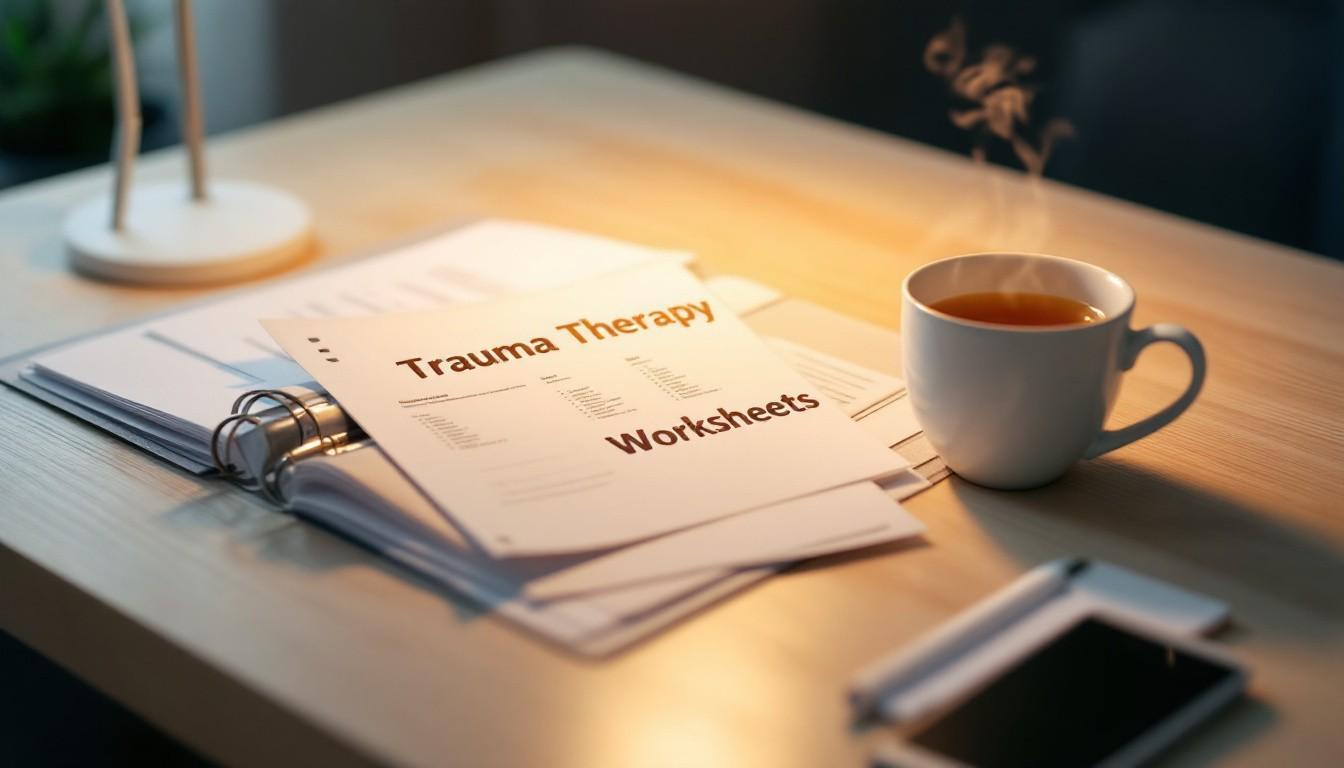Agoraphobia can be a debilitating condition, limiting your world and isolating you from the things you love. Many people struggle with this anxiety disorder, often feeling trapped and helpless.
At Devine Interventions, we understand the challenges you face and offer expert solutions to help you reclaim your life. Our specialized approach combines proven therapies with compassionate care, giving you the tools to overcome agoraphobia and embrace freedom once again.
What Is Agoraphobia?
Defining the Disorder
Agoraphobia extends beyond a simple fear of open spaces. This complex anxiety disorder can severely restrict a person’s life. Individuals with agoraphobia often avoid situations where they feel trapped, helpless, or embarrassed. These situations may include crowded places, public transportation, or even being outside their home alone.
Recognizing the Signs
Agoraphobia manifests through both physical and emotional symptoms. Physical signs often include rapid heartbeat, sweating, and difficulty breathing. Emotionally, individuals might experience intense fear, panic, and a sense of losing control. The National Institute of Mental Health reports that approximately 19.1% of adults in the United States experience anxiety disorders each year.

Debunking Common Myths
Many misconceptions surround agoraphobia. One prevalent myth suggests it’s merely a fear of leaving home. In reality, the disorder presents much more nuanced challenges. Some individuals with agoraphobia can leave their homes but struggle in specific situations. Others might feel comfortable in crowded places but panic on bridges or in elevators. It’s essential to understand that agoraphobia is an anxiety disorder characterized by intense fear or panic attacks in situations where a person feels trapped, helpless, or unable to escape.
Impact on Daily Life and Relationships
Agoraphobia can disrupt daily routines and strain relationships significantly. Simple tasks like grocery shopping or attending social events can become overwhelming challenges. This often leads to isolation and can strain relationships with family and friends who may not fully understand the condition.
Seeking Professional Help
Understanding agoraphobia marks the first step towards recovery. If you or someone you know struggles with symptoms of agoraphobia, professional support can make a substantial difference. At Devine Interventions, we offer a comprehensive approach that addresses both immediate symptoms and the broader impact on a person’s life. Our team believes in treating the whole person, not just the disorder.
The next chapter will explore effective treatment approaches for agoraphobia, including evidence-based therapies and medication options that can help individuals regain control of their lives.
How Can Agoraphobia Be Treated Effectively?
Agoraphobia treatment has advanced significantly in recent years. A combination of evidence-based therapies and personalized care helps individuals overcome their fears and reclaim their lives.
Cognitive Behavioral Therapy: Rewiring Thought Patterns
NLP techniques can be effective for overcoming phobias, including agoraphobia. These techniques include anchoring, reframing, and visualization to transform fear into confidence.
For instance, a therapist might help create a hierarchy of feared situations, starting with less challenging scenarios and progressing to more difficult ones. This step-by-step approach builds confidence and skills over time.
Exposure Therapy: Facing Fears Safely
Exposure therapy proves a powerful tool for overcoming agoraphobia. This technique involves gradual and safe exposure to feared situations. A personalized exposure plan tailored to specific needs and comfort levels is essential.
Treatment often begins with imaginal exposure, where clients visualize feared situations in a safe environment. As progress occurs, in vivo exposure follows, where clients face real-world scenarios with therapist support. This process desensitizes anxiety triggers and builds coping skills.
Medication: A Supportive Tool
While therapy remains the primary treatment for agoraphobia, medication can play a supportive role for some individuals. Sertraline (Zoloft) is well-tolerated and effective for reducing panic symptoms linked to agoraphobia. This medication provides relief while clients work on developing long-term coping strategies through therapy.
It’s important to note that medication decisions always involve consultation with a qualified psychiatrist. A coordinated approach between medication management and therapy ensures comprehensive care.

Holistic Approaches: Addressing the Whole Person
Treating the whole person (not just the symptoms) is vital. Holistic approaches often complement traditional therapies. These might include mindfulness techniques, stress management strategies, and lifestyle changes to support overall well-being.
For example, learning breathing exercises helps manage panic symptoms. Developing a regular exercise routine can reduce anxiety levels (studies show physical activity positively impacts mental health).
Personalized Treatment Plans: Your Unique Path to Recovery
No two cases of agoraphobia are exactly alike. Individualized treatment plans address each client’s specific needs and goals. A plan might include a combination of individual therapy, group sessions, and medication management.
Experienced professionals work collaboratively to ensure comprehensive care. Regular reviews and adjustments to treatment plans based on progress and feedback optimize results.
Treatment for agoraphobia is a journey, and support throughout the process is crucial. With the right combination of therapies and professional guidance, overcoming agoraphobia and regaining freedom becomes possible. The next section explores how a specialized mental health practice can provide the comprehensive care needed for lasting recovery from agoraphobia.
How Does Devine Interventions Treat Agoraphobia?
At Devine Interventions, we offer a comprehensive approach to agoraphobia treatment. Our team of experienced professionals understands that each person’s experience with this anxiety disorder is unique. We create individualized treatment plans tailored to your specific needs and goals.
Personalized Assessment and Planning
When you first come to Devine Interventions, we conduct a thorough 60-90 minute initial consultation. This assessment explores your mental health history, family dynamics, past trauma, and current life situation. Our in-depth evaluation helps us understand the root causes of your agoraphobia and develop a targeted treatment plan.
We believe in collaborative care, so you’re an equal partner in all treatment decisions. Together, we set realistic goals and create a roadmap for your recovery. This plan isn’t set in stone – we regularly review and adjust it based on your progress and feedback.
Multi-Faceted Treatment Approach
Our agoraphobia treatment combines evidence-based therapies with compassionate support. You’ll engage in individual therapy sessions (typically lasting 30 minutes), where you’ll work one-on-one with a therapist trained in cognitive behavioral therapy (CBT) and exposure techniques.
Group therapy sessions offer a chance to connect with others facing similar challenges, reducing feelings of isolation often associated with agoraphobia. These sessions provide a safe space to practice social interactions and learn from peers.
For some clients, medication management may be part of the treatment plan. Our psychiatric providers offer comprehensive medication evaluations and ongoing management to optimize your mental health outcomes.

Ongoing Support and Progress Monitoring
Recovery from agoraphobia is a journey, and we’re with you every step of the way. Our flexible scheduling ensures you have consistent support through therapy sessions and case management. We regularly monitor your progress, celebrate small victories, and adjust strategies as needed.
If you need to provide progress reports (for example, to probation officers), we can provide monthly updates while respecting your confidentiality. We also maintain open communication with your broader recovery network, always with your consent.
Holistic Wellness Integration
We believe in treating the whole person, not just the symptoms. Our approach to agoraphobia extends beyond traditional therapy to address lifestyle factors that impact your overall well-being. This might include stress management techniques, nutrition guidance, or connecting you with community resources that support your recovery.
We offer a continuum of care options, from intensive outpatient programs to ongoing individual therapy. This allows us to provide the right level of support as your needs change over time, without disrupting your therapeutic relationships.
Don’t let agoraphobia control your life any longer. Contact Devine Interventions today to start your journey towards freedom and recovery. Our compassionate team is ready to help you take that first step (and many more after).
Final Thoughts
Agoraphobia can overwhelm your life, but effective treatment exists. Devine Interventions offers comprehensive, personalized care to support your recovery journey. Our experienced professionals combine evidence-based therapies with compassionate support to address the root causes of your anxiety.
We create individualized treatment plans tailored to your specific needs. These plans incorporate cognitive behavioral therapy, exposure techniques, and medication management (when appropriate). Our holistic approach treats the whole person, not just the symptoms.
Don’t let agoraphobia control your life. Take the first step towards freedom by contacting Devine Interventions today. Our team will guide you on your path to recovery, helping you build the skills and confidence to overcome agoraphobia.







